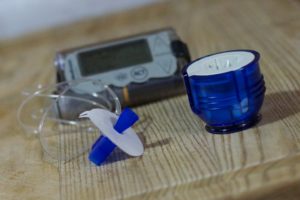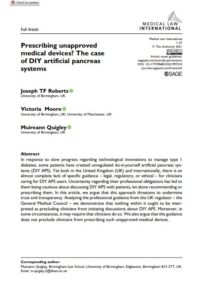This post is a summary of our forthcoming paper in Medical Law International ‘Prescribing Unapproved Medical Devices? The Case of DIY Artificial Pancreas Systems’
Authors: Joseph T F Roberts, Victoria Moore, Muireann Quigley
Healthcare technology innovation in type 1 diabetes (T1D) management has until recently been a relatively slow process. Tired of waiting for commercial manufacturers to produce effective, accessible technological solutions that meet their needs, some patients have created unregulated Do-It-Yourself Artificial Pancreas Systems (DIY APS). Despite the appearance of these systems, at the moment there is an almost complete lack of specific legal, regulatory, or ethical guidance for clinicians caring for DIY APS users. Due to this uncertainty regarding their obligations, clinicians are cautious about discussing DIY APS with patients, let alone recommending or prescribing them.
In this paper we do three things. First, we argue that this cautious approach to discussing DIY APS is undesirable because it threatens to undermine trust and transparency in the clinic. Trust and transparency are important because, without them, patients and clinicians cannot have open and honest discussions about the potential benefits and risks of using DIY APS, potentially damaging the doctor-patient relationship.

Second, we analyse the guidance of the UK regulator, the General Medical Council, and how it applies to adult users of DIY APS who are able to make their own treatment decisions. We show that there is nothing in this guidance which ought to be interpreted as precluding clinicians from discussing DIY APS with, or recommending them to, their patients. Indeed, in cases where the clinician believes using DIY APS might be beneficial to their patients, clinicians may even have an obligation to discuss DIY APS in the clinic. We do not examine how the guidance applies to young patients or adults who do not have the legal capacity to give informed consent.
Third, we show that the General Medical Council’s guidance on prescribing does not prohibit clinicians from prescribing unapproved medical devices to their patients. Although the General Medical Council advises clinicians to exercise caution before prescribing unapproved medical devices, they are not precluded from doing so. If, according to their clinical judgement and in line with their professional obligations, clinicians determine that DIY APS is both necessary to meet the needs of their patient, and that there is sufficient evidence of effectiveness to justify their decision, then they are permitted to prescribe DIY APS to their patients.
Want to know more?
 Read the full paper here or by clicking on the image (left)
Read the full paper here or by clicking on the image (left)
Written by: Joseph Roberts
Funding: Work on this was generously supported by Wellcome Trust Investigator Award in Humanities and Social Sciences 2019-2024 (Grant No: 212507/Z/18/Z), an ESRC Impact Acceleration Award, and a Quality-related Research grant from Research England.
